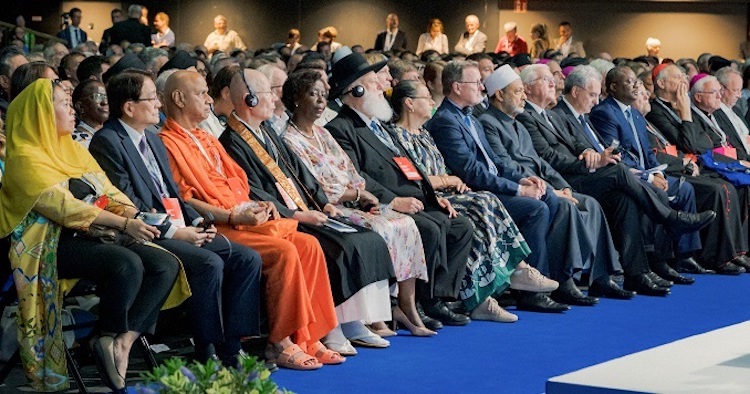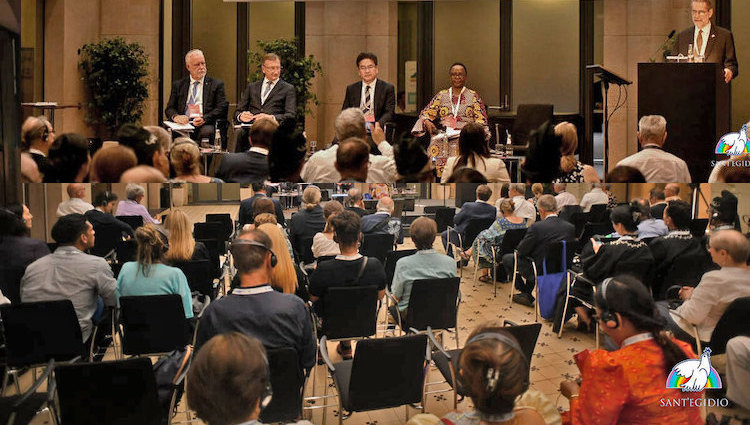By Ramesh Jaura
BERLIN. 19 September 2023 (IDN) — Mark* is 28 years. Like him, those in their twenties believed that atomic bombs, which the United States dropped over the Japanese cities of Hiroshima and Nagasaki, belonged to a remote past. However, since Russian President Vladimir Putin threatened to deploy nuclear weapons in the Ukraine war, they ponder why Germany—united since the Berlin Wall crumbled in 1989—”should not make nuclear weapons.”
Mark (not his real name) conveyed this thought at the Forum in the Berlin-Brandenburg Academy of Sciences and Humanities—the largest non-university research institute for the humanities—of more than 300 years of chequered history. The walls of the Academy’s auditorium show deep marks of bullets fired in the Second World War.
Mark’s comment from the floor—apparently based on the widespread misconception that the more nuclear weapons, the less the danger of a nuclear war—reflected the concerns of the four-person panel conversing the Forum’s theme “A World Free from Nuclear Weapons is Possible”. The panelists were fully aware that the Ukraine War is detrimental to the non-proliferation of nuclear weapons and the peril arising from the ongoing modernization of the atomic arsenal.
The Nuclear Weapons Forum on 11 September was one of the twenty sessions of the International Meeting “The Audacity of Peace” on 10-12 September in Berlin, hosted by the lay Catholic association Community of Sant’Egidio, co-organized by Soka Gakkai International (SGI)—a global community-based Buddhist organization with 12 million members around the world and others.
Mr. Hirotsugu Terasaki, Vice President of Soka Gakkai, led the delegation to the Meeting. He met with various dignitaries, including the President of the Community of Sant’Egidio, Marco Impagliazzo, and the President of the Italian Episcopal Conference, Cardinal Matteo Maria Zuppi.
Mr. Andrea Bartoli, chair of the Forum on A World Free of Nuclear Weapons is Possible, explained the importance of cooperation with Soka Gakkai and its international organization of Soka Gakkai International (SGI). He is the current President of the New York-based Sant’Egidio Foundation for Peace and Dialogue, a member of the steering group of Global Action Against Mass Atrocity Crimes (GAAMAC), and executive advisor of the Soka Institute for Global Solutions (SIGS) of Soka University of America.
Aware of the concern of youth in their twenties, born after the Cold War ended in 1991 after the Berlin Wall came down and the Soviet Union dissolved, SGI Europe Co-Chair Robert Harrap assured that though there is a lot to be done, thanks to the efforts of the United Nations, backed by civil society organizations, two international treaties which concern nuclear weapons have entered into force.
Non-proliferation and Nuclear Abolition Treaties
One of these is the Non-Proliferation Treaty (NPT), which serves as the cornerstone of the nuclear disarmament and non-proliferation regime and is vital in promoting international peace and security. The other is the Treaty on the Prohibition of Nuclear Weapons (TPNW), which, since its entry into force in January 2021, reinforces, complements, and builds on the NPT.
Mr. Peter Prove, Director of International Affairs of the World Council of Churches (WCC), agreed, adding that the Council “was naturally a strong supporter of the ‘humanitarian pledge initiative’ and of the advocacy which led ultimately to the drafting and adoption of the Treaty on the Prohibition of Nuclear Weapons”.
He added: “Of course, many will say that unless and until nuclear-armed States join the TPNW—which is not likely to happen any time soon—the treaty is effectively meaningless”. Bur Mr. Prove does not concur.

“The TPNW…has already succeeded in creating a new normative principle in international law that challenges the ‘normalization’ of the continued possession of such weapons by established nuclear-armed States, to which we have hitherto collectively acquiesced. And the salience of that new normative principle will only grow with each new signature and ratification of the TPNW, especially as we approach the threshold of a majority of UN member States joining the Treaty,” prognosticates Mr. Prove.
Commitment to a world free of nuclear weapons
Tracing commitment of Soka Gakkai and SGI to a world free of nuclear weapons, Mr. Harrap pointed out that sixty-six years ago, in September 1957, Josei Toda, the second president of the Soka Gakkai, made a declaration that informed SG activities for peace ever since. The nuclear arms race accelerated then, and Intercontinental Ballistic Missiles (ICBM) were tested successfully.
Recently, SGI as its international campaign, has taken steps to raise awareness of the nuclear weapons issue, including traveling exhibitions created together with the Nobel Peace laureate the International Campaign to Abolish Nuclear Weapons (ICAN), “Everything You Treasure—For a World Free From Nuclear Weapons.
Soka Gakkai bases its activities on the Buddhist principle of respect for the dignity of life. Its objective is to nurture the culture of peace through grassroots initiatives, public awareness and educational campaigns, and advocacy at different levels, not least at the United Nations.
Dr. Daisaku Ikeda, President of Soka Gakkai International, has for over 40 years written and published an annual “Peace Proposal,” which has consistently focussed, among others, on the United Nations and the abolition of nuclear weapons.
Mr Prove maintained that a world free from nuclear weapons is not only possible; “a world free from nuclear weapons is necessary if we are to avoid one of the greatest man-made threats to the human community and the environment—to God’s unique living Creation on this planet”.
“Nuclear weapons are undoubtedly undesirable, and yet here we are in our current state of affairs burdened with collective threats of nuclear weapons proliferation and horrors of a potential nuclear war,” declared Ms. Liberata Mulamula, a Tanzanian parliamentarian, and the East African country’s veteran diplomat.
She pointed out that Tanzania, under the leadership of the first President and the country’s Founding Father, Mwalimu Julius Kambarage Nyerere played a prominent role in the Non-Aligned Movement to advocate a world without the threat of nuclear weapons.
Tanzania joined the Six-Nation Five-Continent Peace and Disarmament Initiative to support the pressing need of a nuclear-free world. The leaders of the six countries, Greece, Sweden, Argentina, India, and Tanzania, in their appeal on 22 May 1984, said, “…the prevention of nuclear is not an issue that concerns only superpowers. It is of direct concern to all of us since it threatens our lives”.
Against this backdrop, The African Nuclear-Weapon-Free Zone Treaty, also known as the “Pelindaba Treaty”, established the nuclear-weapon-free zone on the African continent. It opened for signature on 12 April 1996 in Cairo, Egypt, and entered into force on 15 July 2009.
Multilateralism has been the centerpiece that keeps any threats to global peace and prosperity at bay. Now more than ever, we need to revive and trust in our age-old mechanism of collective resolution—multilateralism. Ms. Mulamula said.
Joining the call for a world free of nuclear weapons, Mr. Yoshinori Shinohara, Secretary-General of the Asian Conference of Religions for Peace, RKK, explained that one of the main reasons for the organization’s founding was the abolition of nuclear weapons. “The world’s religious leaders, who feared the imminent destruction of humanity due to the extraordinary nuclear arms race between the United States and the Soviet Union from 1960 to 1970, stood up for the prevention of nuclear war and the abolition of atomic weapons, advocating love for humanity and brotherhood”.
Fifty-three years have passed since then, but nuclear weapons have not disappeared, and the threat of nuclear war has increased in recent years. “The Doomsday Clock of the American Scientific Journal shows this year’s worst time, implying that we are living amid a great crisis.” One of the main reasons for this, stated Mr Shinohara, is the growing risk of nuclear use in Ukraine. [IDN-InDepthNews]
Photo: Chair (on podium), four panelists and a section of the audience of the Forum on “A World Free of Nuclear Weapons is Possible” on 11 September 2023 in Berlin held as part of the International Meeting “The Audacity of Peace” hosted by the lay Catholic Association Community of Sant’Egidio. The Forum was co-organized by Soka Gakka and others. Credit: Sant’Egidio.


